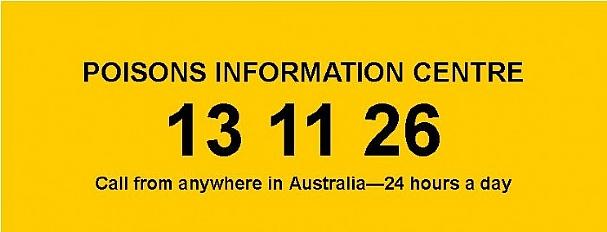First aid for poisoning
Swallowed poison
- Do not try to make the patient vomit.
- Pick up the container and take it to the telephone.
- Call the Poisons Information Centre on 13 11 26.
Poison on the skin
- Remove contaminated clothing, taking care to avoid contact with the chemical.
- Flood the skin with cool running water.
- Wash gently with soap and water and rinse well.
- Call the Poisons Information Centre on 13 11 26.
Poison in the eye
- Flood the eye with water from a cup, jug or slowly running tap. Continue for 10-15 minutes, holding the eyelids open.
- Call the Poisons Information Centre on 13 11 26.
Inhaled poison
- Get the person to fresh air quickly without placing yourself at risk.
- Open doors and windows wide, if safe to do so.
- Call the Poisons Information Centre on 13 11 26.
Why ring the Poisons Information Centre?
- To find out what to do next.
- To obtain correct first aid advice for poisoning.
- To avoid unnecessary visits to the doctor or hospital.
- To obtain up-to-date information (many books and antidote charts are out of date and incorrect).
When should you ring the Poisons Information Centre?
If you or someone in your care may have been poisoned. This includes situations in which a wrong medicine or wrong dose has been given to someone. Do not wait for symptoms to occur. Always check if you are not sure.
Poisons may include:
- prescription medicines
- over the counter medicines
- cleaning and laundry products
- kerosene, petrol, etc
- perfume and aftershave
- car products
- insecticides, weed killers
- paint
- plants, mushrooms and many more, always check.
If a person is bitten or stung by a marine creature, animal, reptile, spider or insect.
If you have any questions or concerns about:
- prevention of poisoning,
- hazards associated with chemicals, plants, pesticides and other products.

How to prevent poisoning
Store medicines and chemicals safely out of reach and out of sight of children, up high in a locked or child resistant cupboard.
Use medicines and chemicals safely. Read directions for use carefully. Do not leave them unattended whilst in use.
Do not transfer medicines or chemicals from their original containers.
Store household products and medicines out of reach and out of sight of children (at least 1.5m high), in a locked or child resistant cupboard. Whilst in use, never leave them in reach or unattended. Separate medicines from household products.
Be sure that all products are properly labelled. Read the label carefully before use.
Clean our your medicine cupboard regularly. Take unwanted and out-of-date medicines to your nearest pharmacy for disposal.
Children tend to imitate adults, so avoid taking medicines in their presence.
Refer to medicines by their proper names. They are not lollies.
Visitors’ bags may contain medicines. Keep them well out of reach of children.
Do not store medicines in the refrigerator unless advised to do so by your pharmacist.
Ask for and use household products and medicines that are in child resistant packaging (blister or strip packs or special push and turn lids).
Always take medicines in a well lit room. Wear your glasses. Follow the directions for use carefully and accurately.
Do not take other people’s medicines.
Avoid distractions when administering medicines; double check before taking them. If you can, establish a ‘normal routine’ for taking your medications.
Parents should establish a ‘checking system’ with each other to avoid giving double doses of medicine to children.
Use appropriate protection when painting, spraying or oven cleaning. Follow the directions for use. Protect skin and eyes. Ensure there is adequate ventilation, with air circulating continuously. Remove any contaminated clothing immediately.
Empty containers from liquid medications or household products should be rinsed with water before they are thrown out.
Be aware that the incidence of poisoning increases when usual household routines are disrupted (moving house, being on holidays, having visitors).
Be aware that many poisonings occur when a product or medicine is not in its usual storage location, when it is in use and left on a bench top or bedside table, or during transport from the shop to home.
Keep everything in original containers, never in cups or soft drink bottles.

